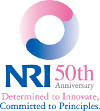NRI is celebrating its 50th anniversary this year. As NRI reaches this major milestone, Yasuki Okai, President of NRI Holdings America, reflects on NRI’s past 50 years in the US and addresses its future plans for development in the US.

Why is NRI continually interested in US expansion and what makes now an optimal time for this?
1. Large size and stable, continuous growth
The US market's most appealing attributes are its size and growth trajectory. First, the US is the world's largest market. Second, the US market continues to grow at a relatively steady pace. For many Japanese companies bumping up against growth limitations in their home market, expanding into ASEAN and other emerging markets is important and likely to remain so, but these emerging markets have their own drawbacks. For one, their regulations, languages and business customs differ from one country to the next, requiring new entrants to set up separate business units for each market. Another drawback is the difficulty of sufficiently scaling up a business in these markets. With more and more Japanese companies gaining confidence in expanding overseas thanks to Abenomics and the yen's depreciation trend of recent years, some are starting to refocus on the US market from the standpoint of its scale and growth prospects. Japanese M&A targeted at US companies is growing as Japanese companies seek to expedite US market entry. High-profile Japanese acquisitions of US companies have recently occurred in the life and nonlife insurance, logistics and manufacturing sectors, among others.
2. US market as launch pad for entry into Latin American emerging markets
Additionally, North America has been gaining importance in recent years as a launch pad for entry into Latin American emerging markets. While many Japanese companies in Brazil are plagued by onerous regulations, crime and other problems, countries such as Mexico, Colombia and Chile are gaining favor as potential markets. Columbia, for example, is a populous country with improving public safety. It is an attractive market in terms of geographic advantage and economic growth. In addition to individual countries' appeal as markets, Latin America's strategic value in relation to North American operations increases when a company views North America and Latin America together as a single market (the Americas). Countries such as Mexico are gaining favor as production and logistics hubs by virtue of being located between North and South America.
3. US as innovation mecca
Another attraction of the US market is that, although highly competitive, it is dynamically evolving and always at the forefront of innovation. Financial institutions have recently been acquiring IT startups. While this so-called FinTech trend is garnering attention globally, it is particularly prominent in the US in terms of both innovative startup companies' prevalence and financial institutions' proactivity vis-à-vis innovation. Japanese financial institutions also feel threatened by IT-centric innovation that could change their existing businesses structure. In response, some have started to establish innovation centers in the US, the world's innovation mecca. Finance is not the only industry susceptible to major structural disruption by IT. In industries such as healthcare, the Internet of Things is driving the emergence of new services. Meanwhile, the US is taking the lead in many new business domains in fields such as agriculture and robotics. Japanese companies are starting to build new businesses spearheaded by their US subsidiaries in the aim of improving their competitiveness both in Japan and globally.